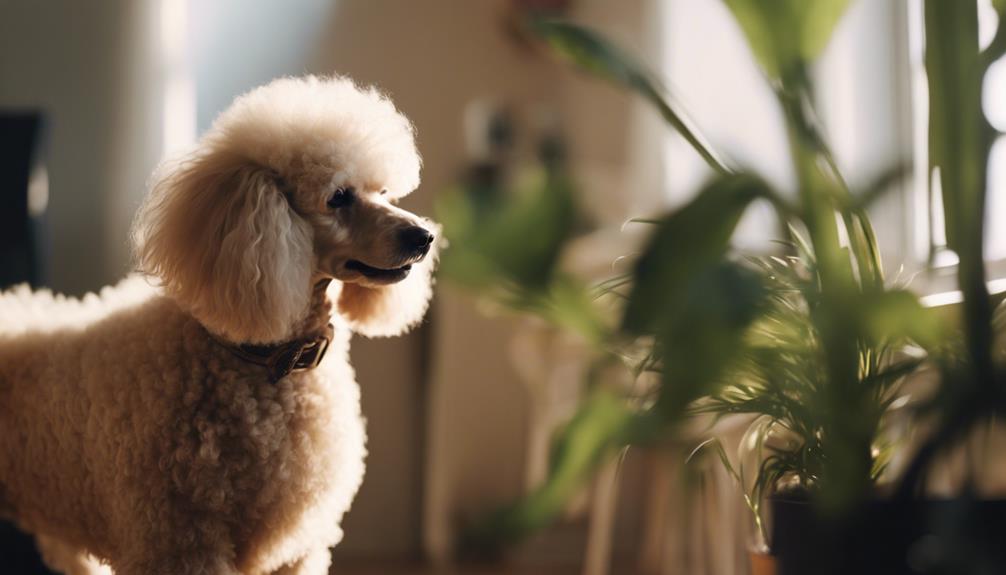Did you know that approximately 20% of poodles exhibit shy or fearful behaviors? Understanding how to help your shy poodle gain confidence can be a rewarding journey. By implementing specific strategies and techniques tailored to their needs, you can make a significant difference in your furry friend's well-being and overall happiness. Stay tuned to discover practical tips and insights on how to support your shy poodle in building their confidence and thriving in various situations.
Key Takeaways
- Celebrate small wins to motivate shy Poodles.
- Create a safe space for exploration and play.
- Use positive reinforcement to boost confidence.
- Gradually introduce new experiences for confidence building.
Understanding Shyness in Poodles
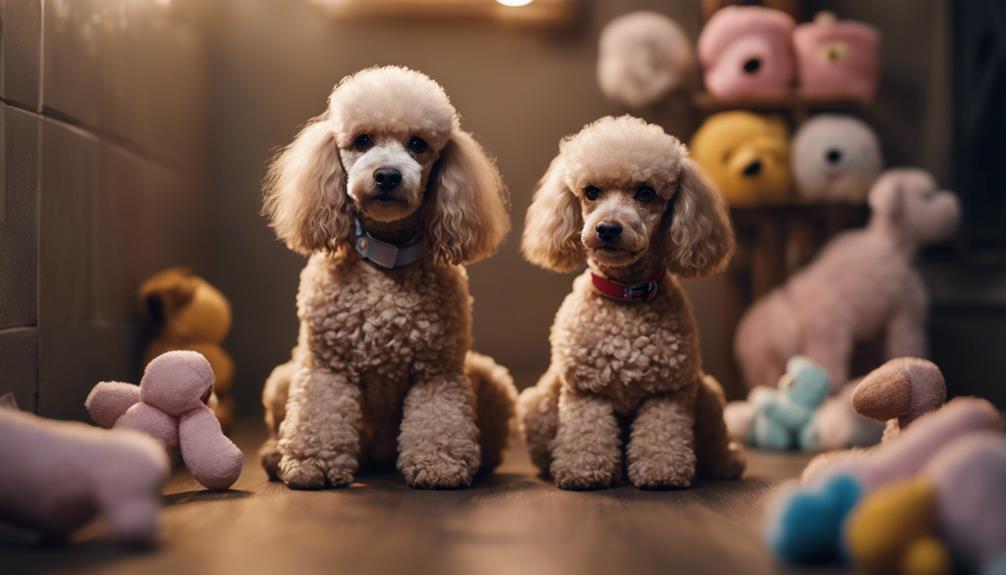
Shyness in Poodles, whether inherited or influenced by past experiences, manifests through various behaviors and reactions. It's crucial to understand that shy Poodles may struggle with confidence in new environments, around unfamiliar people, or when exposed to loud noises. When it comes to confidence building, recognizing the root cause of their shyness is the first step towards helping them overcome their fears.
Building confidence in shy Poodles involves creating a supportive and safe environment where they can gradually be exposed to situations that trigger their shyness. Positive reinforcement plays a key role in boosting their self-assurance. By offering treats, praise, and gentle encouragement when they display brave behavior, you can help them associate confidence with positive experiences.
Additionally, providing shy Poodles with predictable routines and consistent training can help them feel more secure and in control of their surroundings. Patience, understanding, and a gentle approach are essential when guiding shy Poodles towards building their confidence.
Signs of Fear in Poodles

You may notice signs of fear in your poodle through their body language and behavior patterns. Trembling, hiding, avoiding eye contact, excessive barking, whining, or panting could indicate fear. Keep an eye out for tail tucking, lip licking, yawning, seeking comfort, or retreating to safe spaces as signs of fear in your beloved poodle.
Fearful Body Language
When observing your Poodle's body language, pay close attention to signs of fear such as lowered body posture, tucked tail, and ears pinned back. Fearful body language in Poodles can be quite telling of their emotional state. Here are some key signs to look out for:
| Fearful Body Language Signs | Description |
|---|---|
| Lowered body posture | Indicates submission |
| Tucked tail | Shows anxiety or distress |
| Ears pinned back | Signifies unease |
| Trembling | Reflects nervousness |
Understanding these cues is crucial in helping your shy Poodle build confidence and feel secure in various situations. By recognizing these signs, you can provide the support and reassurance your Poodle needs to overcome their fears.
Avoidance Behavior Patterns
Avoidance behavior patterns in Poodles, especially when faced with fear, can manifest in various ways such as hiding, turning away, or retreating from unfamiliar situations. When your shy Poodle encounters something that triggers fear, observe for signs like avoiding eye contact, seeking isolation, or displaying submissive behaviors. These avoidance cues are crucial indicators that your furry friend is feeling overwhelmed and anxious. Watch for freezing in place, tail tucking, or stress signals like yawning or lip licking, as these are signs that your Poodle is struggling with the situation. By recognizing and understanding these avoidance behaviors, you can create a safe and supportive environment to help your Poodle feel more secure and build their confidence.
Boosting Poodle Confidence
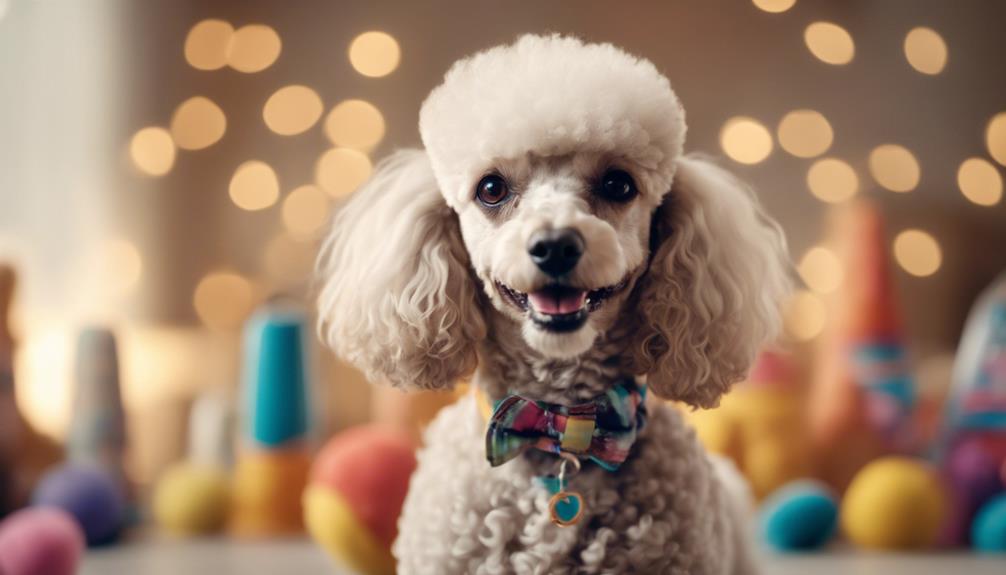
Boost shy Poodles' confidence by gradually introducing them to new experiences and environments. Positive reinforcement is key to helping them overcome their shyness and build self-assurance. Here are three essential ways to boost your Poodle's confidence:
- Celebrate Small Wins: Acknowledge and reward even the slightest display of confidence or curiosity. This will motivate your Poodle to continue stepping out of their comfort zone.
- Create a Safe Space: Establish a secure environment where your Poodle feels comfortable exploring and trying new things. This safe space will serve as a foundation for building confidence.
- Encourage Play and Exploration: Engage in activities that challenge your Poodle mentally and physically. Interactive games and exploratory walks can help boost their confidence levels as they navigate new experiences.
Socialization Techniques for Poodles
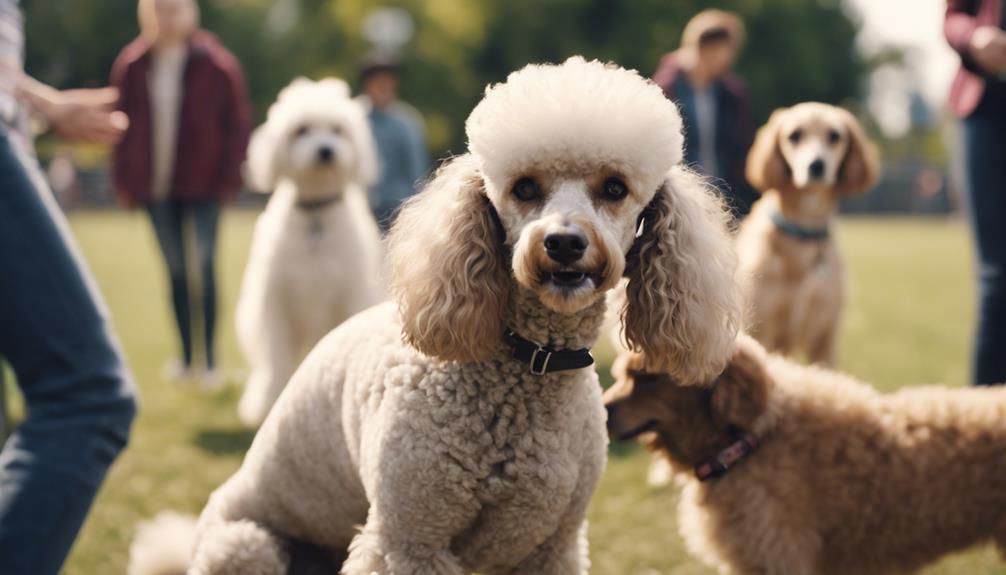
To help your Poodle develop confidence and social skills, focus on early and consistent exposure to various environments, people, and animals. Socialization plays a crucial role in shaping your dog's behavior and temperament. Regularly exposing your Poodle to new stimuli like sounds, sights, and smells can help them adapt and feel more secure in different situations. Interaction with other dogs in a controlled setting can also boost their social confidence, teaching them how to communicate and play with other animals effectively.
Here is a helpful table outlining some socialization techniques for your Poodle:
| Socialization Techniques | Description |
|---|---|
| Controlled Playtime | Supervised interaction with other dogs to promote social skills and positive experiences. |
| Exposure to New Environments | Gradually introduce your Poodle to different places to build confidence and reduce anxiety. |
| Positive Reinforcement | Reward good behavior with treats and praise to create positive associations with social interactions. |
Positive Reinforcement Training Methods
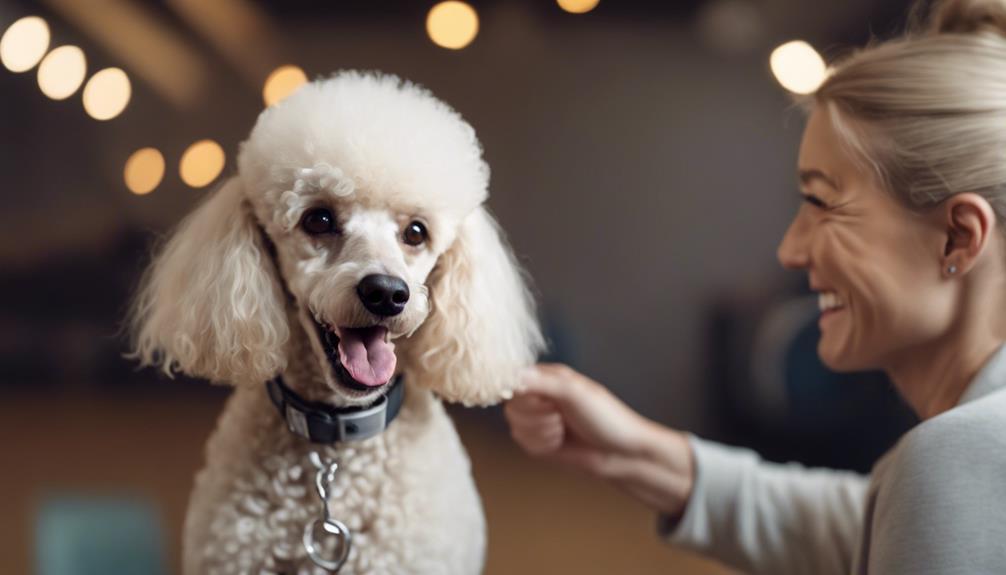
Encouraging your shy Poodle through positive reinforcement training methods can help them build confidence and navigate social interactions more comfortably. Positive reinforcement training focuses on rewarding desired behaviors in your shy Poodle, which can have a significant impact on their confidence levels. By using treats, praise, and toys as rewards, you can motivate your Poodle to engage in new experiences and interactions. Consistent and positive training sessions will help your shy Poodle associate social situations with positive outcomes, ultimately boosting their confidence in various environments.
- Rewarding desired behaviors enhances confidence.
- Treats, praise, and toys are effective motivational tools.
- Consistent positive training fosters a sense of security and support.
Building Trust With Shy Poodles
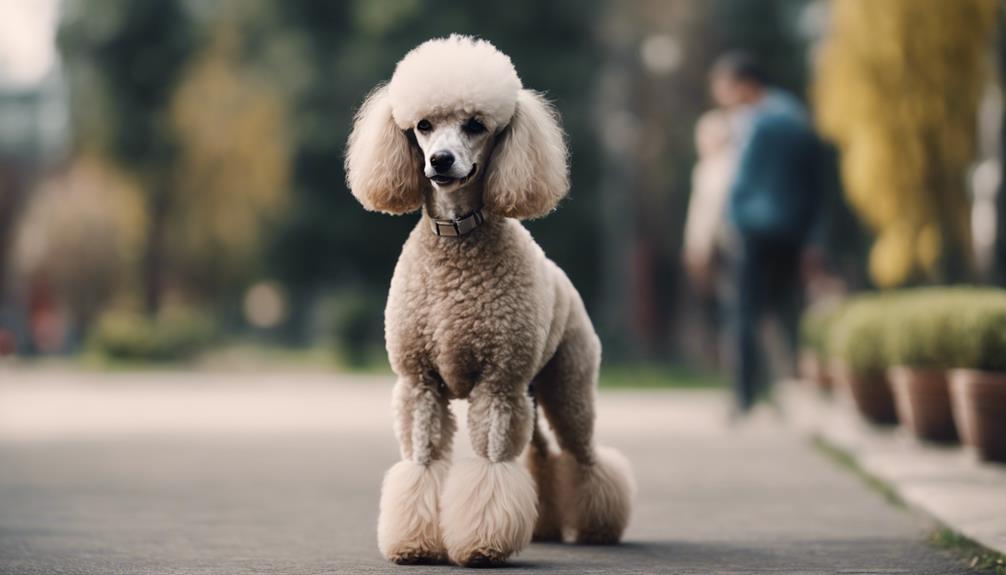
When building trust with shy Poodles, gentle handling and positive reinforcement are key factors in fostering a secure and confident relationship with your furry companion. Shy and fearful dogs require patience and understanding as they navigate the world around them. Consistent interactions, combined with a predictable routine and safe spaces, can help your shy Poodle feel more at ease and trusting. It's essential to respect their personal space and boundaries to build a foundation of trust. By approaching them with calmness and reassurance, you can gradually encourage positive interactions. Offering treats, engaging in play, and creating a peaceful environment can all contribute to establishing a bond built on trust. Remember, every small step forward is a significant achievement when working with shy Poodles. Your dedication to their well-being and emotional needs will ultimately lead to a stronger connection and a happier, more confident pup.
Encouraging Exploration and Play
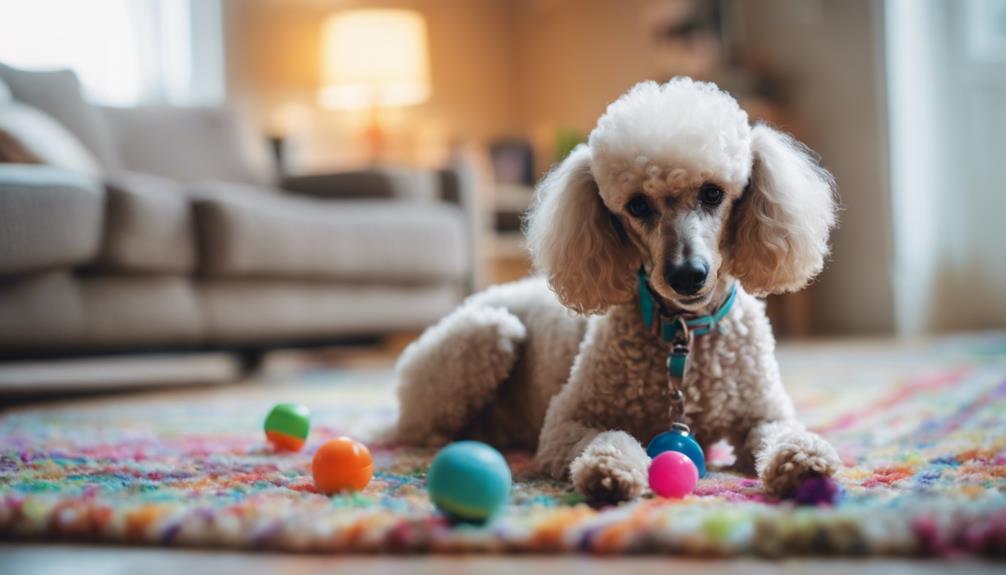
Encouraging exploration and play is crucial for helping shy Poodles build confidence and self-assurance. By introducing new toys and objects in a safe space, you can stimulate their curiosity and desire to engage. Positive reinforcement, like treats and praise, can motivate them to interact and explore, fostering a sense of accomplishment and empowerment.
Play Promotes Confidence
To build confidence in shy Poodles, fostering a playful environment that encourages exploration and interaction with objects is key. Play promotes confidence in shy Poodles by providing them with opportunities to learn, problem-solve, and gain a sense of accomplishment in a safe space. Engaging in play helps shy Poodles build trust, overcome fears, and develop important social skills that are essential for their overall well-being. Interactive play sessions with toys not only stimulate mental and physical activity but also boost confidence levels in shy Poodles, making them more self-assured and happy pets. Incorporating play into daily routines can significantly contribute to helping shy Poodles become more confident, social, and well-adjusted companions.
Exploration Boosts Self-Assurance
Building self-assurance in shy Poodles through exploration and play fosters a sense of adventure and confidence in their abilities. Encouraging dogs to explore their surroundings not only stimulates their curiosity but also helps them build confidence. Interactive toys and engaging activities provide mental stimulation, promoting self-discovery in shy Poodles. By exposing them to a variety of safe environments, you can help your furry friend overcome fear and hesitation. Additionally, playful interactions with other dogs or humans can assist in developing social skills and boosting confidence. Regularly introducing new experiences and positively reinforcing their exploration efforts can significantly enhance the self-assurance of shy Poodles. Remember, patience and encouragement are key in nurturing your Poodle's confidence through exploration and play.
Handling Poodle Anxiety
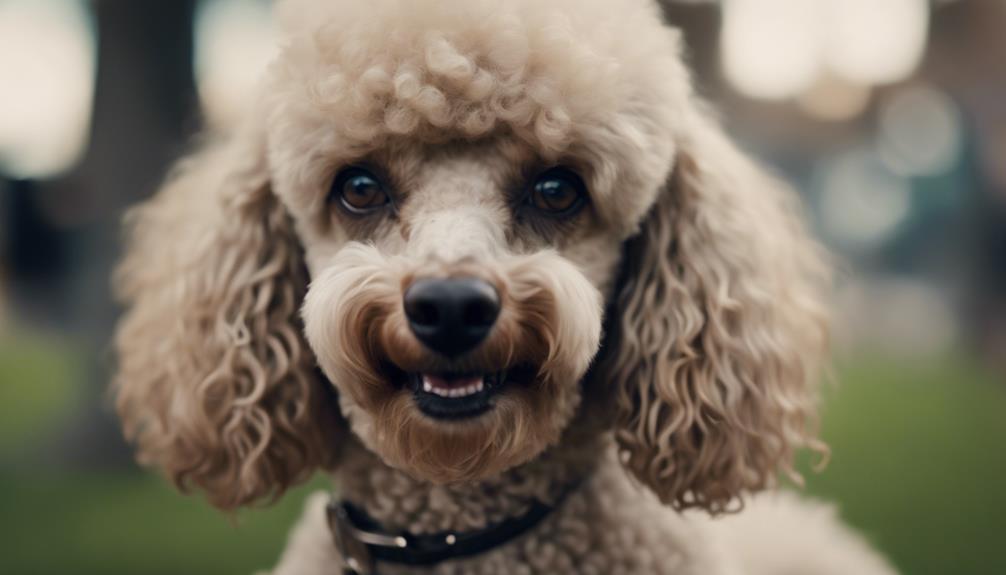
When addressing anxiety in shy Poodles, understanding their triggers and behaviors is crucial to providing effective care and support. Poodles, with their sensitive and intelligent nature, can easily become anxious due to various factors. Here are some key points to consider:
- Identifying Triggers: Changes in routine, loud noises, and separation from their owners are common triggers for anxiety in Poodles. Pay close attention to these triggers to better manage their anxiety.
- Recognizing Behaviors: Keep an eye out for signs of anxiety in Poodles, such as excessive barking, trembling, or destructive chewing. Understanding these behaviors can help you address their anxiety more effectively.
- Creating Safe Spaces: Providing a consistent routine, socialization, and positive reinforcement can help reduce anxiety in Poodles. Additionally, creating safe spaces where they feel secure can offer comfort during anxious times.
Calming Techniques for Timid Poodles

If your timid Poodle could benefit from some calming techniques, consider incorporating gentle touch therapy, a relaxing music playlist, or peaceful aromatherapy scents. These methods can help reduce anxiety and create a more soothing environment for your furry friend. By introducing these calming techniques gradually, you can help your timid Poodle feel more secure and confident in their surroundings.
Gentle Touch Therapy
In soothing timid Poodles, gentle touch therapy offers a nurturing approach to build trust and alleviate anxiety. This technique involves using soft, reassuring touches to help calm and comfort shy Poodles. Here are some key points to consider when implementing gentle touch therapy:
- Observing Body Language: Pay close attention to your Poodle's body language cues to gauge their comfort level.
- Creating a Safe Environment: Ensure the surroundings are peaceful and free from distractions to enhance the calming effects of gentle touch therapy.
- Building Consistency: Incorporate gentle touch therapy into daily interactions to establish a routine that promotes trust and relaxation.
Relaxing Music Playlist
To help your timid Poodle relax and build confidence, consider curating a soothing playlist of calming music. Playing calming music can reduce anxiety and stress in shy Poodles, fostering a sense of tranquility. Studies suggest that music has a soothing effect on dogs, including timid ones. Opt for classical melodies or specially designed pet relaxation music to create a serene atmosphere for your furry friend. Pay attention to the tempo, tone, and volume of the music to ensure it promotes relaxation. Consistent exposure to relaxing tunes can aid in building your dog's confidence and comfort, gradually helping them feel more at ease in various situations. Take the time to build your dog's confidence through the power of music.
Peaceful Aromatherapy Scents
Consider incorporating peaceful aromatherapy scents like lavender and chamomile to help calm your timid Poodle and create a soothing environment for them to feel more relaxed. Aromatherapy can be a powerful tool in aiding your shy Poodle to reduce anxiety and stress, gradually helping them build confidence in new environments. Using calming scents in forms such as diffusers, sprays, or infused bedding can make a significant difference in your Poodle's overall well-being. Introducing these scents through nose work activities can engage your Poodle's sense of smell, providing mental stimulation and relaxation simultaneously.
- Utilize diffusers or sprays with calming scents.
- Consider incorporating aromatherapy-infused bedding.
- Engage in nose work activities to introduce peaceful scents gradually.
Confidence-Building Toys and Games
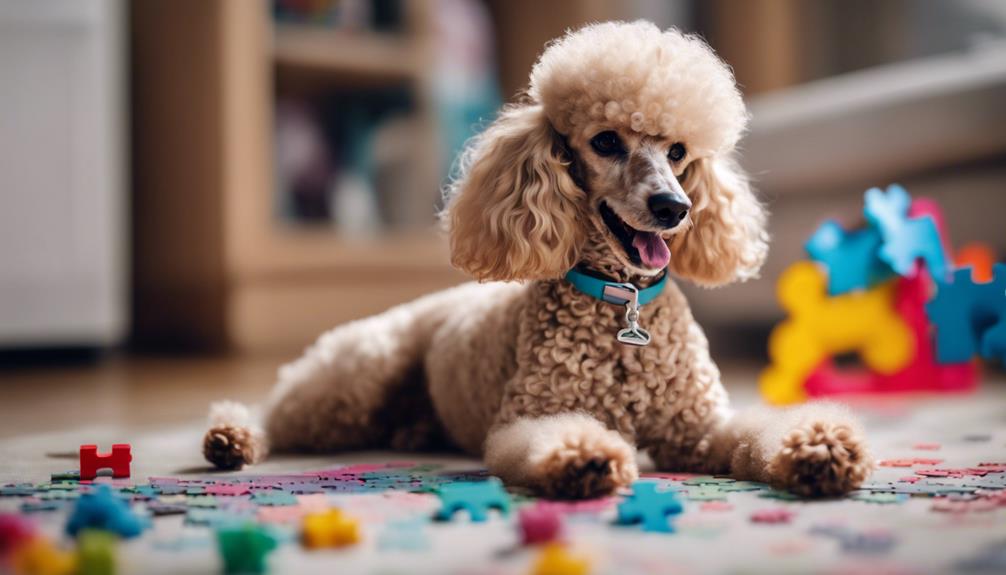
Looking for ways to boost your shy Poodle's confidence through engaging toys and games? Interactive puzzle toys like treat-dispensing balls or Kong toys can provide mental stimulation for your furry friend, helping them feel more confident as they solve problems to get to the treats. Hide-and-seek games with treats hidden around the house can encourage your shy Poodle to explore and feel more secure in their familiar surroundings. Tug-of-war games with suitable toys can help build trust and confidence in your interactions with your Poodle, strengthening your bond. Setting up agility or obstacle courses at home can offer physical challenges that promote confidence and coordination in shy Poodles. Interactive toys that require pawing, pushing, or pulling can also help your Poodle feel more confident in their abilities and enhance the connection between you. By incorporating these confidence-building toys and games into your routine, you can support your shy Poodle in becoming more self-assured and outgoing.
Creating Safe Spaces for Poodles
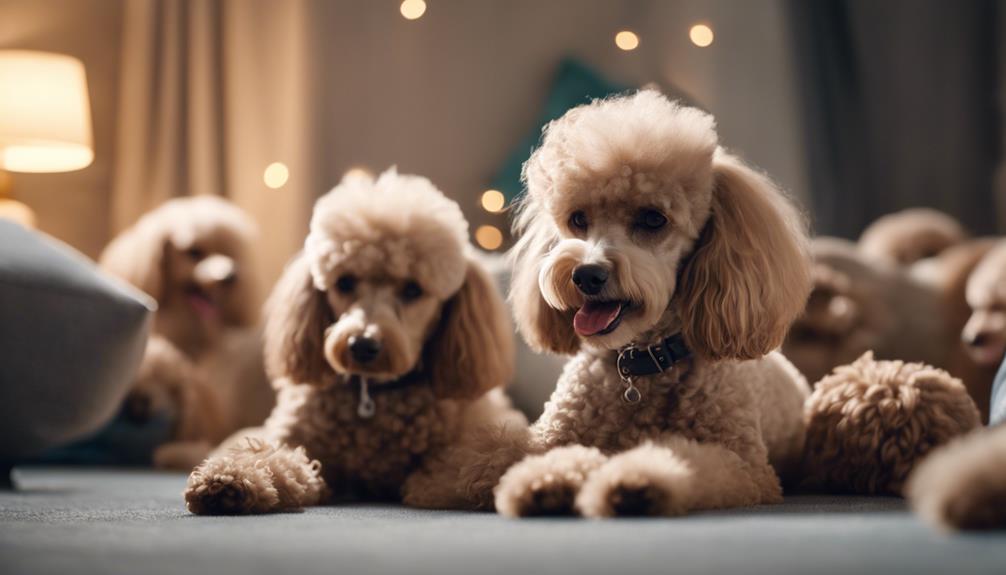
Creating a secure haven for your Poodle is essential for their well-being and confidence. Poodles thrive in safe retreat areas that offer comfort, warmth, and positive associations. Here are three key ways to create safe spaces for your beloved pet:
- Designate No Kid and No Stranger zones: Establish areas where your Poodle can go to feel safe and secure, away from unfamiliar faces or loud noises.
- Use treats to reinforce safety: Encourage positive associations by giving treats when your Poodle is in their designated safe spaces, helping to build trust and confidence.
- Encourage relaxation and retreat: Ensure that your Poodle has access to their safe spaces at all times, allowing them to retreat when feeling overwhelmed or anxious.
Addressing Poodle Behavior Challenges
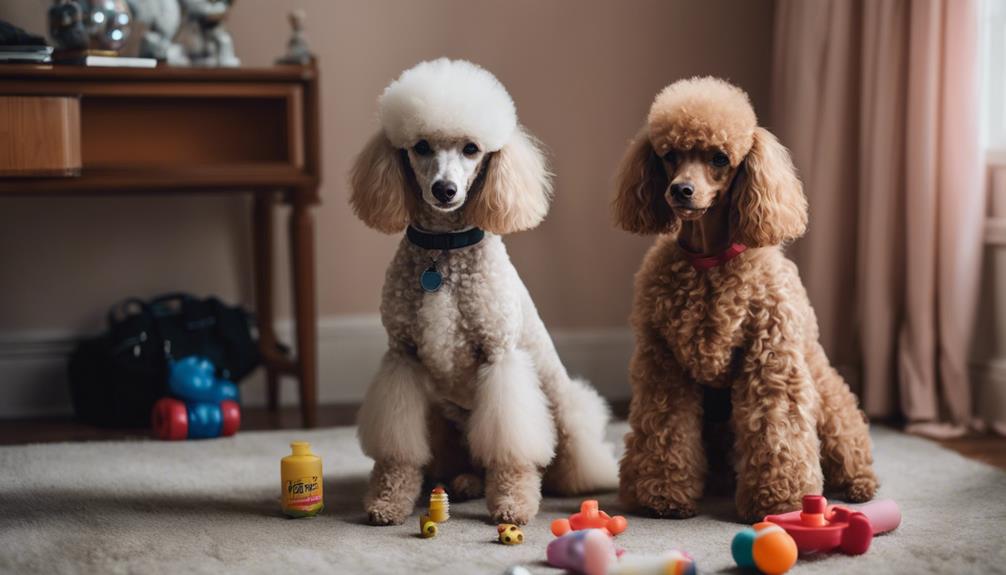
As your shy Poodle navigates new environments and experiences, it is important to understand and address their behavior challenges with patience and positive reinforcement techniques. Shy Poodles may exhibit behaviors like hiding, avoiding eye contact, or trembling in unfamiliar situations. By acknowledging these behaviors and responding with empathy, you can help your dog feel more secure and confident. Consistent training routines, coupled with understanding your Poodle's personality, are key in overcoming these challenges.
| Behavior Challenges | Tips for Addressing | Importance of Action |
|---|---|---|
| Hiding in new places | Encourage exploration by creating a safe space at home where your Poodle feels comfortable. | Helps your Poodle feel secure and gradually more at ease. |
| Avoiding eye contact | Use positive reinforcement techniques to reward your Poodle for making eye contact, helping build trust and connection. | Strengthens the bond between you and your dog, boosting confidence. |
| Trembling in new situations | Comfort your Poodle with gentle petting or soothing words, gradually exposing them to new experiences at their own pace. | Shows your Poodle that you are there to support and protect them, promoting a sense of safety. |
Consistency in Training Shy Poodles
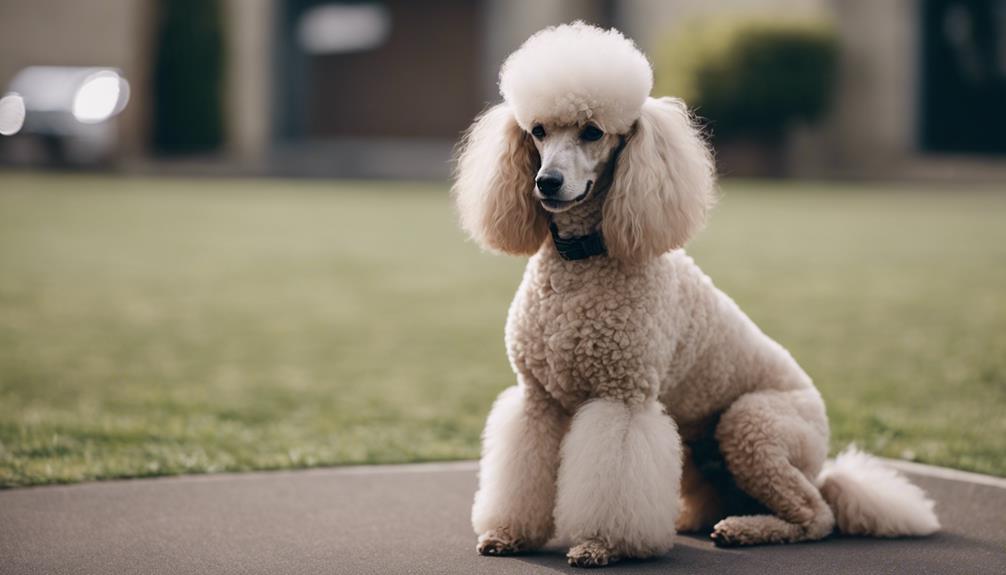
Training your shy Poodle requires consistency in your approach. By using the same cues and rewards, you help reinforce positive behaviors and build trust with your furry companion. Remember, maintaining a steady training schedule and avoiding sudden changes are key to helping your shy Poodle feel secure and confident.
Training Methods for Shy Poodles
Consistency plays a vital role in helping shy Poodles feel secure and confident during training sessions. When working with shy Poodles, remember that they thrive on routine and predictability. Here are some essential training methods to consider for your shy Poodle:
- Use the same cues and rewards consistently to establish a reliable routine.
- Provide clear and predictable training sessions to build their confidence gradually.
- Offer repetition and positive reinforcement to help them feel secure in their learning process.
Building Trust With Poodles
To foster trust with shy Poodles, maintaining a consistent and reliable approach in their training is paramount. Poodles, especially those who are timid, thrive on routine and clear expectations during training sessions. When working with shy Poodles, remember that repetition is key to helping them understand and feel secure in the training process. Utilizing positive reinforcement techniques can be highly effective in gaining the trust of these sensitive dogs. Additionally, be mindful of the importance of direct eye contact when interacting with shy Poodles, as it can help establish a connection and build trust over time. Remember, building trust takes patience and dedication, but it is crucial in helping shy Poodles overcome their shyness and flourish.
Celebrating Poodle Progress
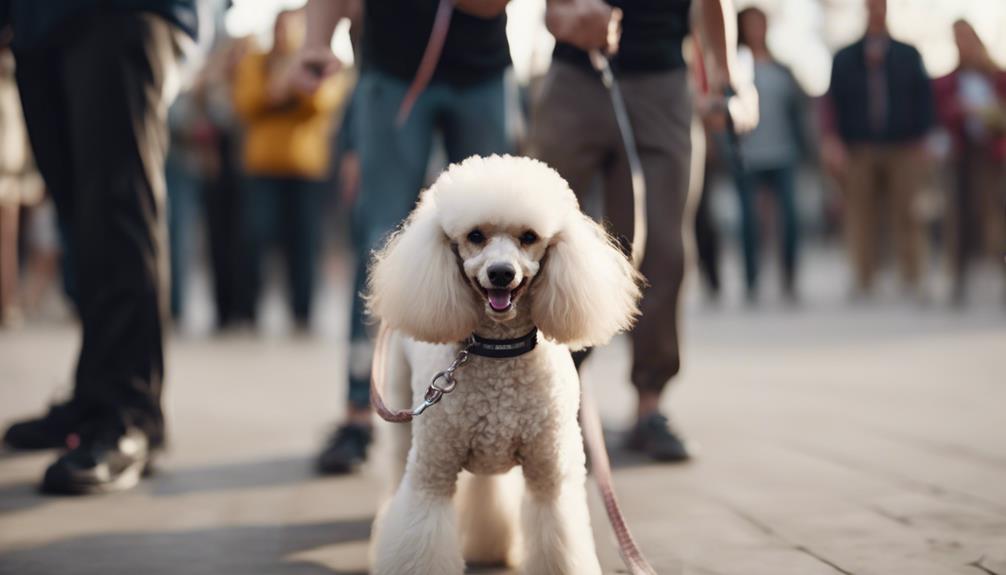
When witnessing a shy Poodle's progression in confidence, it's heartwarming to acknowledge the small victories they achieve along the way. Celebrating poodle progress is essential in nurturing their self-assurance and helping them overcome their shyness. Here are some ways to celebrate and encourage a shy Poodle's progress:
- Positive Reinforcement: Rewarding your Poodle for brave actions like approaching a new person or showing curiosity towards unfamiliar objects can reinforce their confidence-building behaviors.
- Journaling Milestones: Keeping a journal or taking photos to document their progress can help you see how far they've come and provide motivation to continue working on their confidence.
- Consistent Training: By consistently working with your Poodle and being patient with their pace, you can help them gain confidence in various situations and environments.
Frequently Asked Questions
How Do I Build My Shy Dog's Confidence?
To build your shy dog's confidence, start with socialization techniques. Gradually expose them to new environments, use positive reinforcement like treats, play interactive games, and provide a safe space for exploration. Consistency and patience are key.
Why Is My Poodle so Shy?
Your Poodle's shyness may be due to various factors, such as genetics, socialization, or past experiences. Understanding these reasons is essential. By providing positive reinforcement training, gradual exposure, and building trust, you can help them overcome their shyness.
How Do You Desensitize a Shy Dog?
To desensitize a shy dog, start by exposing them gradually to triggers. Pair these experiences with positive reinforcement like treats. Watch for stress signals and adjust the pace. Consistency and patience are key.
How Do I Train My Dog to Not Be Shy?
To train your shy dog not to be shy, focus on behavioral modification. Use positive reinforcement like treats and praise. Gradually expose them to new experiences. Engage in socialization activities. Create a safe environment.
Conclusion
So, there you have it – the secret recipe to turning your shy poodle into a confident pooch! Remember, patience and positive reinforcement are key. Treats, safe spaces, and tailored training will work wonders. Celebrate the small victories and watch your poodle blossom before your eyes. Keep up the good work, you savvy poodle whisperer!
